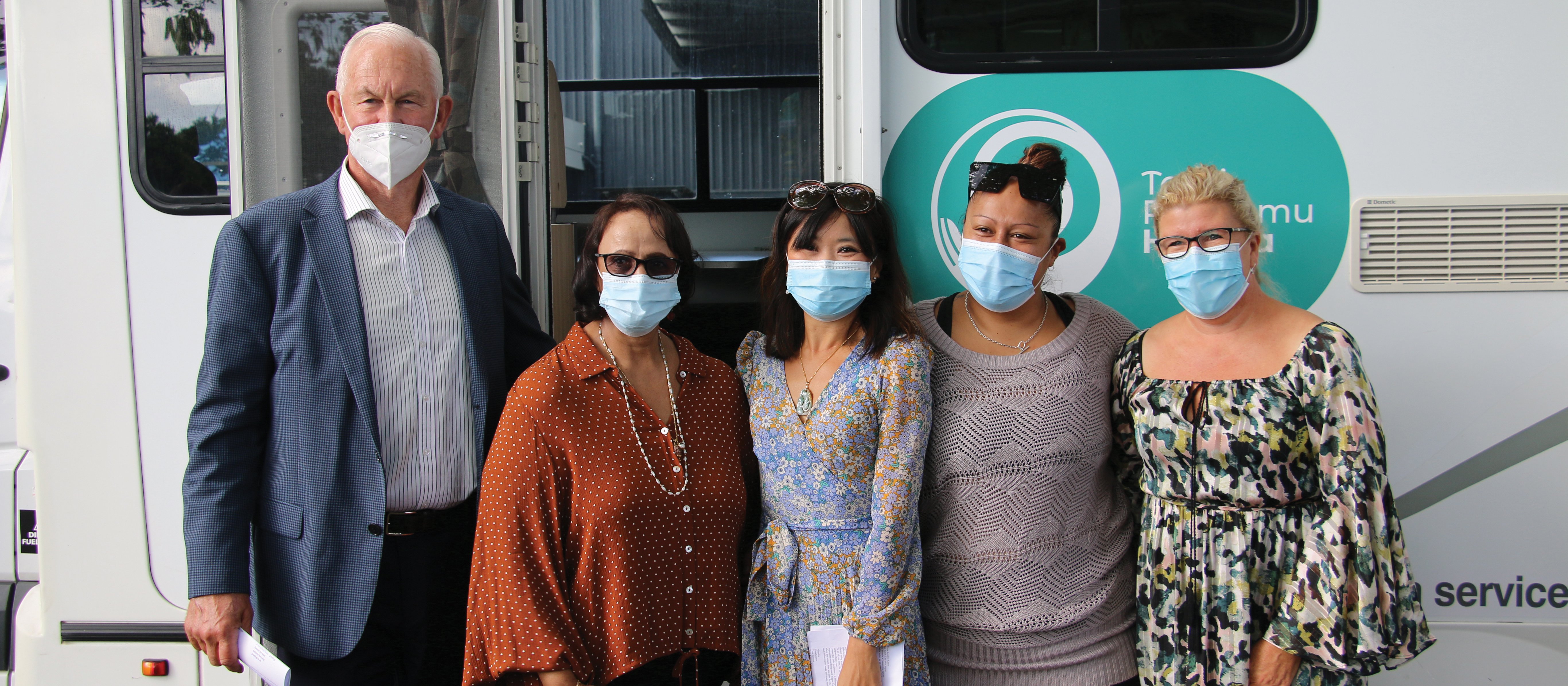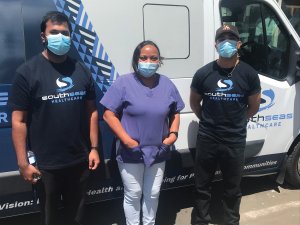Respiratory physician Lutz Beckert considers chronic obstructive pulmonary disease management, including the prevention of COPD, the importance of smoking cessation and pulmonary rehabilitation, and the lifesaving potential of addressing treatable traits. He also discusses the logic of inhaler therapy, moving from single therapy to dual and triple therapy when indicated, as well as other aspects of management
GP blown away by mobile care success
GP blown away by mobile care success

People are more open to seeing us, more open to talking to us, there is more trust
Running a south Auckland mobile primary care service has been a career highlight, says specialist GP Juliet Tay.
“For about 15 years, I’ve been sitting in my little room seeing patients and families with all sorts of challenges,” says Dr Tay.
“But to now be seeing families like that in their own homes: the shift in their thinking has surprised me, even with people who haven’t wanted to engage with their GP for years.
“People are more open to seeing us, more open to talking to us, there is more trust.”
Dr Tay, nurse practitioner Rebecca Fenn and healthcare assistant Lonah Fiaui began their service, Te iti Pounamu, on 17 February as a sixmonth pilot programme.
The service has funding of $210,000 from Alliance Health Plus PHO and mostly serves the south Auckland suburb of Manurewa.
Dr Tay is taking leave from her position at Greenstone Family Clinic in Manurewa to undertake the pilot, while the van comes from the fleet provided to the PHO for COVID-19-related swabbing and vaccination work.
A positive response so far
She says the free home visits are uncovering undiagnosed conditions, mostly diabetes and hypertension, and are reconnecting people with their GPs.
“It’s really blown me away…people are getting on board with what we’re suggesting instantly, then we do follow-up visits a month later and they’ve picked up their medications, they are reconnecting with healthcare.
“It’s a shift I’ve never seen before, and it’s been a career highlight for me. I know we are only scratching the surface, but I just want to keep going.”
Picking up speed
She says the team began cautiously as they were not sure how many patients they could handle. At first, they took patient referrals only from housing providers Penina Trust and Square Peg Housing, and social care agency Pride Project Clendon.
But, after 100 referrals and 142 home visits in the first six weeks, Dr Tay says they are now in discussions with social service providers such as the Salvation Army, Emerge Aotearoa and Mahitahi Trust (no connection to the Northland PHO).
Referrals are coming from New Zealand Police and the Counties Manukau DHB intensive community team mental health service.
Alliance Health Plus practice network manager Vanita Hira has produced a report on the service’s first six weeks, and says it supports their call for ongoing funding.
Ms Hira says the service will cost $450,000 a year to operate, but it will save an estimated $600,000 a year in offset secondary healthcare costs.
“They are able to make early interventions with very specific, hard-to-reach groups, and it needs to be funded and recognised. But by whom? That’s the big question, but it’s not a choice. We have to do this.”
According to the report, 45 per cent of the patients seen were Pacific peoples and 43 per cent were Māori.
Most say they are enrolled with a practice but do not attend, while more than 25 per cent have long-term mental health issues.
“We are finding people the DHB and ministry should be responsible for, but nobody has them on their radar. COVID-19 has taught us this already, the value of mobility and easy access telehealth services, they help put people back on the radar for primary care and pro-active care.”
This article is due to appear in the April 27 issue of New Zealand Doctor Rata Aotearoa.
We're publishing this article as a FREE READ so it is FREE to read and EASY to share more widely. Please support us and the hard work of our journalists by clicking here and subscribing to our publication and website






![Barbara Fountain, editor of New Zealand Doctor Rata Aotearoa, and Paul Hutchison, GP and senior medical clinician at Tāmaki Health [Image: Simon Maude]](/sites/default/files/styles/thumbnail_cropped_100/public/2025-03/Barbara%20Fountain%2C%20editor%20of%20New%20Zealand%20Doctor%20Rata%20Aotearoa%2C%20and%20Paul%20Hutchison%2C%20GP%20and%20senior%20medical%20clinician%20at%20T%C4%81maki%20Health%20CR%20Simon%20Maude.jpg?itok=-HbQ1EYA)
![Lori Peters, NP and advanced health improvement practitioner at Mahitahi Hauora, and Jasper Nacilla, NP at The Terrace Medical Centre in Wellington [Image: Simon Maude]](/sites/default/files/styles/thumbnail_cropped_100/public/2025-03/2.%20Lori%20Peters%2C%20NP%20and%20advanced%20HIP%20at%20Mahitahi%20Hauora%2C%20and%20Jasper%20Nacilla%2C%20NP%20at%20The%20Terrace%20Medical%20Centre%20in%20Wellington%20CR%20Simon%20Maude.jpg?itok=sUfbsSF1)
![Ministry of Social Development health and disability coordinator Liz Williams, regional health advisors Mary Mojel and Larah Takarangi, and health and disability coordinators Rebecca Staunton and Myint Than Htut [Image: Simon Maude]](/sites/default/files/styles/thumbnail_cropped_100/public/2025-03/3.%20Ministry%20of%20Social%20Development%27s%20Liz%20Williams%2C%20Mary%20Mojel%2C%20Larah%20Takarangi%2C%20Rebecca%20Staunton%20and%20Myint%20Than%20Htut%20CR%20Simon%20Maude.jpg?itok=9ceOujzC)
![Locum GP Helen Fisher, with Te Kuiti Medical Centre NP Bridget Woodney [Image: Simon Maude]](/sites/default/files/styles/thumbnail_cropped_100/public/2025-03/4.%20Locum%20GP%20Helen%20Fisher%2C%20with%20Te%20Kuiti%20Medical%20Centre%20NP%20Bridget%20Woodney%20CR%20Simon%20Maude.jpg?itok=TJeODetm)
![Ruby Faulkner, GPEP2, with David Small, GPEP3 from The Doctors Greenmeadows in Napier [Image: Simon Maude]](/sites/default/files/styles/thumbnail_cropped_100/public/2025-03/5.%20Ruby%20Faulkner%2C%20GPEP2%2C%20with%20David%20Small%2C%20GPEP3%20from%20The%20Doctors%20Greenmeadows%20in%20Napier%20CR%20Simon%20Maude.jpg?itok=B0u4wsIs)
![Rochelle Langton and Libby Thomas, marketing advisors at the Medical Protection Society [Image: Simon Maude]](/sites/default/files/styles/thumbnail_cropped_100/public/2025-03/6.%20Rochelle%20Langton%20and%20Libby%20Thomas%2C%20marketing%20advisors%20at%20the%20Medical%20Protection%20Society%20CR%20Simon%20Maude.jpg?itok=r52_Cf74)
![Specialist GP Lucy Gibberd, medical advisor at MPS, and Zara Bolam, urgent-care specialist at The Nest Health Centre in Inglewood [Image: Simon Maude]](/sites/default/files/styles/thumbnail_cropped_100/public/2025-03/7.%20Specialist%20GP%20Lucy%20Gibberd%2C%20medical%20advisor%20at%20MPS%2C%20and%20Zara%20Bolam%2C%20urgent-care%20specialist%20at%20The%20Nest%20Health%20Centre%20in%20Inglewood%20CR%20Simon%20Maude.jpg?itok=z8eVoBU3)
![Olivia Blackmore and Trudee Sharp, NPs at Gore Health Centre, and Gaylene Hastie, NP at Queenstown Medical Centre [Image: Simon Maude]](/sites/default/files/styles/thumbnail_cropped_100/public/2025-03/8.%20Olivia%20Blackmore%20and%20Trudee%20Sharp%2C%20NPs%20at%20Gore%20Health%20Centre%2C%20and%20Gaylene%20Hastie%2C%20NP%20at%20Queenstown%20Medical%20Centre%20CR%20Simon%20Maude.jpg?itok=Z6u9d0XH)
![Mary Toloa, specialist GP at Porirua and Union Community Health Service in Wellington, Mara Coler, clinical pharmacist at Tū Ora Compass Health, and Bhavna Mistry, specialist GP at Porirua and Union Community Health Service [Image: Simon Maude]](/sites/default/files/styles/thumbnail_cropped_100/public/2025-03/9.%20Mary%20Toloa%2C%20Porirua%20and%20Union%20Community%20Health%20Service%20in%20Wellington%2C%20Mara%20Coler%2C%20T%C5%AB%20Ora%20Compass%20Health%2C%20and%20Bhavna%20Mistry%2C%20PUCHS%20CR%20Simon%20Maude.jpg?itok=kpChr0cc)